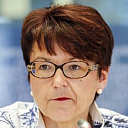Olaf’s interference with the fundamental rights of European citizens breaches legal barriers and the organisation’s director general should tender his resignation, writes Inge Gräßle.
Being a ‘person concerned’ in an OLAF case may leave you feeling like K. in Franz Kafka’s ‘The Castle’. Allegations are never clarified or proven, and all attempts to shed some light on your own case eventually peter out.
These allegations are elusive. I have had EU officials sitting in my office, broken individuals, struggling with allegations they hardly knew anything about but which they were nevertheless meant to refute. The final OLAF report, sent to the Member State, had not been handed out to them; there had been no legal proceedings, thus there was no chance for them to claim legal justice or to ‘at least’ defend their reputation.
At their workplaces, they had to suffer violations of their privacy, such as the seizure of their mobile phones and their hard disks, without any chance for a judicial review. I have dealt with EU citizens who were victims of character assassinations by the media in their home country, which accused them, based on OLAF information, of being fraudsters.
At the same time, millions of euros keep disappearing from the EU budget, which is why OLAF was actually established in the first place.
‘Tough’ investigation methods interfering with fundamental rights
The1999 OLAF regulation said nothing about the protection of personal rights. Consequently, the European Court of Justice was kept busy handling issues on the right of defence, the right to be heard, the right of access to the file, the right to an impartial investigation, the presumption of innocence and the reasonable-time requirement, just to name a few.
Since the Lisbon Treaty took effect in 2009, the Charter of Fundamental Rights of the EU, which declares these rights to be unalienable, has become binding.
The case of former Health Commissioner John Dalli, who lost his office in October 2012 after allegations of corruption and an ensuing OLAF investigation, provides the most vivid example of OLAF’s ‘tough’ investigative methods, which seem to include breaching legal barriers – including, incidentally, by the OLAF Director General himself.
The OLAF Supervisory Committee’s report clearly describes interferences with fundamental rights, going against both the Charter and the European Convention on Human Rights.
Requests for telephone toll records, or the production of a telephone record by a witness at the request of the OLAF investigator, who also gives advice on what to ask in order to lure the person concerned into a trap, are just some of the examples of the infringements noted by the committee.
Legal loopholes must be closed
The fact that OLAF Director General Giovanni Kessler declares these investigation methods ‘perfectly legal’ in front of Parliament adds insult to injury. In this light, it is unsurprising that Commission President José Manuel Barroso makes no attempt to force one of his Directors General to comply with the applicable European fundamental rights, and neither is the chaotic manner in which the plenary votes on the new OLAF regulation were carried out in July this year.
The adoption of some additional amendments, which would have reinforced fundamental rights, was missed by two votes. Seven colleagues had their voting intention corrected from ‘against’ to ‘in favour’ in the final minutes.
On top of the legislative loopholes, there are loopholes in the legal remedies that will not be closed by the introduction of the European Public Prosecutor. Without a European Criminal Court, a European Public Prosecutor is a legally-problematic construction, and all the more so should he or she have a liking for the same ‘tough’ methods as the OLAF Director General – as the saying goes, „you can’t make an omelette without breaking a few eggs”.
The OLAF Director General must resign and accept responsibility for the breaches of the Charter and the Convention. Legislators must define a catalogue of investigative powers and repeal the immunity of officials, so that they take full responsibility for their actions under civil and criminal law.
In the words of criminal law expert Hans-Heiner Kühne of Trier University: „Europe exercises sovereign rights like in remote feudal times. It calls to mind the early 19th century, which we have overcome long since in the Member States.”


